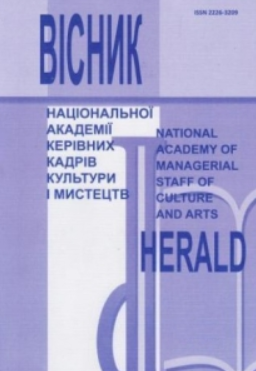ОПЕРА МИРОСЛАВА СКОРИКА «МОЙСЕЙ» ЗА ПОЕМОЮ ІВАНА ФРАНКА ЯК НАРАТИВ КЛАСИКО-РОМАНТИЧНОГО ІДЕАЛУ
MYROSLAV SKORYK'S OPERA "MOSES" BASED ON A POEM BY IVAN FRANKO AS A NARRATIVE OF THE CLASSICAL-ROMANTIC IDEAL
Author(s): Viktor StepurkoSubject(s): Theatre, Dance, Performing Arts, Music, Aesthetics
Published by: Національна академія керівних кадрів культури і мистецтв
Keywords: narrator; aesthetic platform; rhetorical figures; narrative concept; intentional level;
Summary/Abstract: The purpose of the article is to explore the main narratives of Myroslav Skoryk's opera "Moses" based on the poem by Ivan Franko, from the point of view of the classical-romantic aesthetic platform of the struggle for the ideal. The crisis of modern society motivates the composer to fulfill the role of the Guide, which requires urgent changes in the vector of artistic development in the direction of highly spiritual philosophical, and ethical orientation. The methodology is to consider the psychological narrative of the romantic creative orientation of I. Franko (R. Golod), to analyze modern problems of opera in Ukraine (I. Gamkalo), to use comparative analysis of epoch-making problems in Ukraine of early XX - XXI centuries and to compare egalitarian and elitist understanding the orientation of the work of M. Skoryk (L. Kiyanovska). The scientific novelty of the approaches is related to the consideration of the composer's narrative discourse as an appeal to the generalized intonation and figurative symbolism of musical stylistics, rather than the stylization of certain historical or ethnic components. For the first time, M. Skoryk's opera "Moses" was considered as a work that foretells a difficult path to freedom, prosperity, and happiness. Conclusions. The work expresses a narrative focus on the synthesis of the classical-romantic compositional-formative construct with a generalized symbolic "timeless" understanding of philosophical and poetic imagery. In this context, the church's monodic trichord or appeal to the figurative sphere of M. Lysenko's vocal works express narratives of turning to God and the idea of the dream homeland, which ultimately forms a personal mythological space of existence.
Journal: Вісник Національної академії керівних кадрів культури і мистецтв
- Issue Year: 2021
- Issue No: 2
- Page Range: 262-266
- Page Count: 5
- Language: Ukrainian

